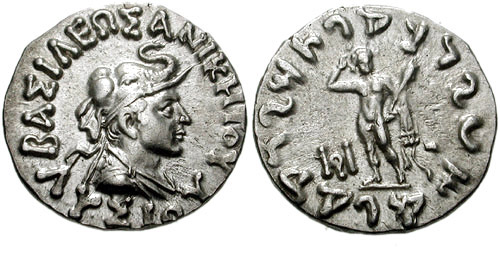Lysias Anicetus on:
[Wikipedia]
[Google]
[Amazon]
 Lysias Anicetus ( Greek: ;
Lysias Anicetus ( Greek: ;
Image:Lysias-150.jpg, Lysias with elephant scalp and Herakles.
Image:Lysias-156.jpg, Lysias with kausia, and Herakles.
Image:Lysias-157.jpg, Coin of Lysias, with bust of Herakles with club, and elephant in reverse.
Coins of Lysias
{{Hellenistic rulers Indo-Greek kings 2nd-century BC rulers in Asia
 Lysias Anicetus ( Greek: ;
Lysias Anicetus ( Greek: ; epithet
An epithet (, ), also byname, is a descriptive term (word or phrase) known for accompanying or occurring in place of a name and having entered common usage. It has various shades of meaning when applied to seemingly real or fictitious people, di ...
means "the Invincible") was an Indo-Greek king.
Time of reign
According to numismatistBopearachchi
Osmund Bopearachchi (born 1949) is a Sri Lankan historian and numismatist who has specialized notably standardized the coinage of the Indo-Greek and Greco-Bactrian kingdoms. He is currently Emeritus Director of the CNRS at the École Normale Supé ...
, Lysias was a close successor to Menander I and Zoilos I
Zoilus I Dicaeus ( grc, Ζωΐλος Δίκαιος, Zōïlos Dikaios; epithet means "the Just") was an Indo-Greek king who ruled in Afghanistan and Pakistan and occupied the areas of the Paropamisade and Arachosia previously held by Menander I ...
, and therefore may have ruled around 130–120 BCE. R. C. Senior suggests a similar date.
Bopearachchi suggests that Lysias' territory covered the areas of the Paropamisade
Paropamisadae or Parapamisadae (Greek: Παροπαμισάδαι) was a satrapy of the Alexandrian Empire in modern Afghanistan and Pakistan, which largely coincided with the Achaemenid province of Parupraesanna. It consisted of the districts ...
and Arachosia, but his coins have been found in the Punjab and it is possible that Lysias ruled most of the Indo-Greek territory for a period, though perhaps in cooperation with Antialcidas, with whom he shared most of his monograms.
Lysias apparently claimed to be a descendant of Demetrius, using a similar reverse of Heracles crowning himself, Demetrius' epithet ''Invincible'', and sometimes the elephant crown always worn by this king. A similar reverse was also used by Zoilus I, who may have ruled some decades earlier and was likely an enemy of Menander.
Lysias' rule seems to have begun after the murder of Menander's infant son Thrason, and since his coins do not resemble Menander's it seems as though he, just as Zoilus, belonged to a competing line. Despite his magnificent coinage, his policies were probably rather defensive. The Bactrian kingdom had recently fallen to invading nomads and though the Indo-Greeks managed to avoid the same fate, they became isolated from the Hellenistic world.
Coin types
Lysias issued a number of bilingual Indian coins. On his silver portrait types he appears either diademed or dressed in various types of headgear worn by earlier kings: the elephant scalp of Demetrios I, a bull's horns helmet or Corinthian helmet with scales, and the Greek flat hat "kausia". He also appeared throwing a spear. The reverse is always Herakles crowning himself, and holding his club, with the new addition of a palm to signify victory. He also issued a series of Attic tetradrachms, and even smaller denominations (a hemidrachm is known) for circulation in Bactria. His Indian type square bronzes show a bust of Herakles/elephant."Mule coins" (overstrikes)
There is a bronze which features the obverse of Lysias and the reverse of Antialcidas. This was interpreted by Tarn and other earlier scholars as though the two kings might have forged some kind of alliance, but later, a bronze with the opposite arrangement was found. The modern view is that these coins were "mules"--in other words, an improperly overstruck issue of one of the pertinent rulers. While not signs of an alliance, they still suggest that Lysias' and Antialcidas' reigns were adjacent.See also
* Indo-Greek Kingdom * Greco-Buddhism * Indo-ScythiansReferences
* ''The Greeks in Bactria and India'',W. W. Tarn
Sir William Woodthorpe Tarn (26 February 1869 – 7 November 1957) was a British classical scholar and a writer. He wrote extensively on the Hellenistic world, particularly on Alexander the Great's empire and its successor states.
Life
William ...
, Cambridge University Press
External links
Coins of Lysias
{{Hellenistic rulers Indo-Greek kings 2nd-century BC rulers in Asia